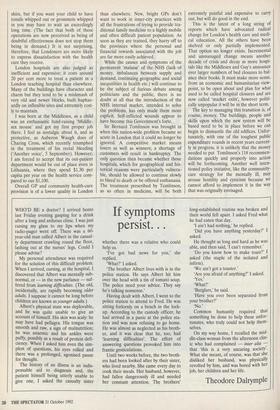If symptoms persist.. .
WHO'D BE a doctor? I arrived home last Friday evening gasping for a drink after a long and arduous clinic. I was just raising my glass to my lips when my radio-pager went off. There was a 60- year-old man called Albert in the casual- ty department crawling round the floor, lashing out at the nurses' legs. Could I please advise?
My personal attendance was required for the solution of this difficult problem. When I arrived, cursing, at the hospital, I discovered that Albert was mentally sub- normal, or — in the new parlance — suf- fered from learning difficulties. (The old, incidentally, are rapidly becoming older adults. I suppose it cannot be long before children are known as younger adults.) Albert's physical state was deplorable, and he was quite unable to give an account of himself. His skin was scaly: he may have had pellagra. His tongue was smooth and raw, a sign of malnutrition; he was anaemic and his ankles were puffy, possibly as a result of protein defi- ciency. When I asked him even the sim- plest of questions, his eyes rolled and there was a prolonged, agonised pause for thought.
The history of an illness is an indis- pensable aid to diagnosis and, the patient himself being utterly unable to give one, I asked the casualty sister whether there was a relative who could help us.
`I've got bad news for you,' she replied.
`What?' I asked.
`The brother Albert lives with is in the police station. He says Albert hit him over the head with a tin of tomato soup. The police need your advice. They say he's talking nonsense.'
Having dealt with Albert, I went to the police station to attend to Fred. He was sitting forlornly on a bench in the lock- up. According to the custody officer, he had arrived in a panic at the police sta- tion and was now refusing to go home. He was almost as neglected as his broth- er, and it was clear that he, too, had `learning difficulties'. The effort of answering questions provoked him into frantic gesticulations.
Until two weeks before, the two broth- ers had been looked after by their sister, who lived nearby. She came every day to cook their meals. Her husband, however, had fallen dangerously ill and needed her constant attention. The brothers' long-established routine was broken and their world fell apart. I asked Fred what he had eaten that day.
`I ain't had nothing,' he replied. `Did you have anything yesterday?' I asked.
He thought as long and hard as he was able, and then said, 'I can't remember.'
`Do you know how to make toast?' I asked (the staple of the isolated and infirm).
`We ain't got a toaster.'
`Are you afraid of anything?' I asked. `Yes.'
`What?'
`Burglars,' he said.
`Have you ever been separated from your brother?'
`No.'
Common humanity required that something be done to help these unfor- tunates, who truly could not help them- selves.
On my way home, I recalled the mid- dle-class woman from the afternoon clin- ic who had complained — inter alia that 'this is a very uncaring society'. What she meant, of course, was that she disliked her husband, was physically revolted by him, and was bored with her job, her children and her life.
Theodore Dalrymple


























































 Previous page
Previous page